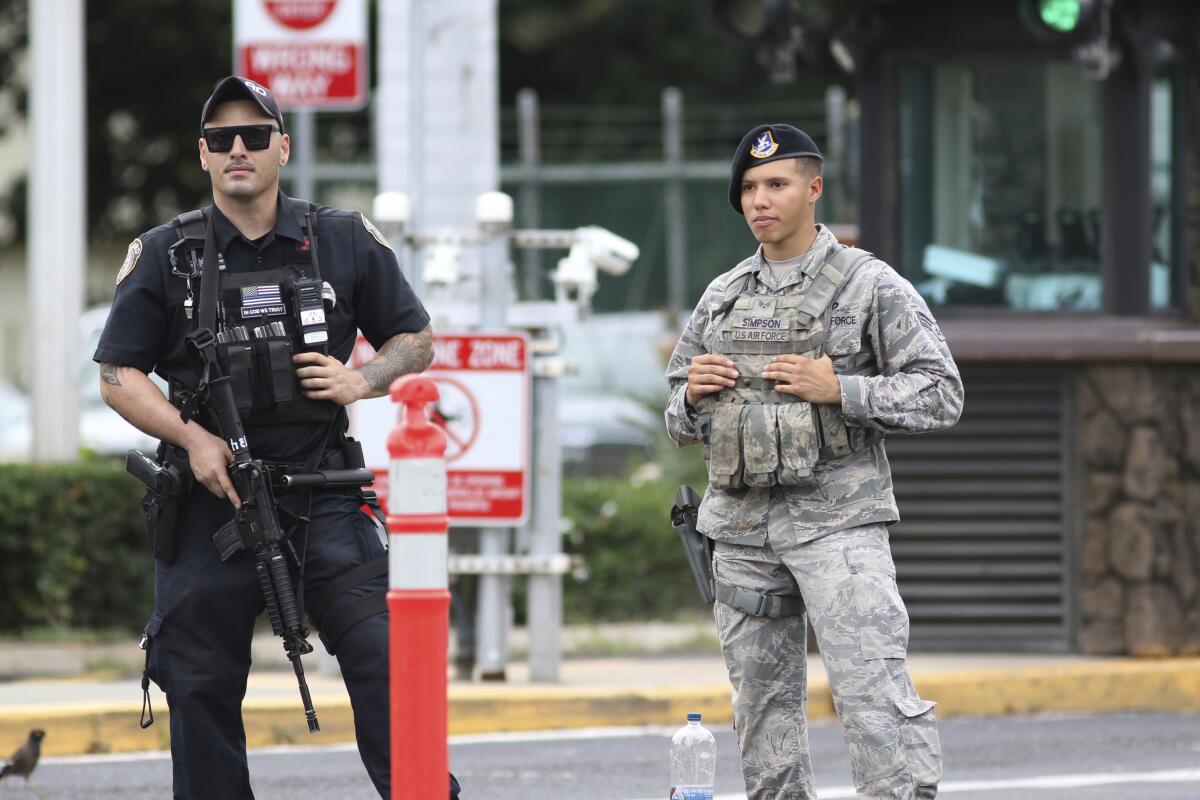Pearl Harbor shooting left two Defense Department workers dead within 23 seconds

- Share via
HONOLULU — The U.S. Navy sailor who fatally shot two people at Pearl Harbor before killing himself was unhappy with his commanders and had been undergoing counseling, a military official said Friday.
Gabriel Romero, 22, also faced nonjudicial punishment, which is a lower-level administrative process for minor misconduct, said the official, who spoke on condition of anonymity to discuss personnel matters not made public. Romero used his two service weapons in the attack, the official said.
Romero also wounded a 36-year-old man in the attack Wednesday at the naval shipyard within the storied military base before turning the gun on himself, authorities said. That victim is in stable condition at a hospital.
In a second attack at a Navy base this week, a shooter opened fire in a classroom building Friday at Naval Air Station Pensacola in Florida — leaving four people dead, including the assailant, and multiple people wounded.
The Pearl Harbor shooting came just days before a ceremony to remember those who perished in the Japanese bombing 78 years ago that propelled the U.S. into World War II.
Security will be beefed up as usual for the annual event, which is expected to draw survivors, veterans, dignitaries and others Saturday to honor the more than 2,300 Americans killed on Dec. 7, 1941.
Military officials said Friday at a news conference that they had not found a motive for the Pearl Harbor shooting but that there’s no evidence of domestic terrorism. They said the isolated attack, witnessed by shipyard employees in an area with thousands of workers, unfolded in about 23 seconds.
Romero, who was from Texas and enlisted in the Navy two years ago, was dead when authorities arrived, and he was armed for his job standing watch and providing security for the fast attack submarine Columbia, which is at Joint Base Pearl Harbor-Hickam for maintenance, officials said.
Retired Army Col. Gregory Gross, a former military judge, said that just because Romero faced nonjudicial punishment doesn’t automatically mean he should have been taken off watch duty.
“It could have been something as simple as you were late for work,” said Gross, who presided over part of the court-martial for the 2009 shooting at Ft. Hood in Texas.
But if the misconduct were something like assault, then it would have been easy to take Romero off watch duty and take away his weapons, Gross said.
“All it takes is for the commander to say, ‘You’re not getting a weapon,’ and he would be taken off that watch,” he said.
It was not known whether Romero knew his victims, Roldan Agustin, 49, and Vincent Kapoi Jr., 30.
Agustin was born in Laoag City, Philippines, and moved to Hawaii when he was 2, according to his mother, Ida Agustin.
“He’s a good man,” she told the Associated Press through tears.
“I’m so sorry, anak ko; I’m still shaking,” she added Friday, using the phrase “my child” in Ilocano, a Filipino language.
Family members said Roldan Agustin served in the Navy and retired from the Army National Guard, then became a metals inspector at the Pearl Harbor Naval Shipyard.
In a statement, his brother said Agustin enjoyed working on cars with his friends and spending time with family.
“We will forever remember Roldan to be humble and honest, and a generous and patient man,” the statement said.
Kapoi’s wife, Tara Kapoi, said her husband grew up in Waianae, a town on the west side of Oahu.
“We don’t know what happened,” she said Thursday, asking for privacy.
A family statement described him as an “easy-going, fun-loving, ‘let’s do this’ man.” Services were scheduled for Dec. 15.
He was a metals inspector apprentice, the Navy said.
College roommate Daniel Vu described Kapoi as a soft-spoken and hardworking “family guy” who woke up at 3 a.m. to work at the fishing docks to pay for tuition. Kapoi graduated from the University of San Francisco in 2011 and was proud of his Native Hawaiian and Filipino heritage, Vu told news website Honolulu Civil Beat.
“He was very giving, very generous and willing to sacrifice a lot,” Vu said.
Jamie Hiranaka, president of the union representing the three workers, said they were all inspectors who checked welding and other work.
The union, the International Federation of Professional and Technical Engineers Local 121 Hawaii, said it’s trying to help employees get through the shooting that produced “fear, terror, sadness and grief.”
“Some were witnesses, others heard the gunshots, others locked down into the closest building they could find, but most were locked in their offices not knowing [what] was happening,” a union statement said.
Mass shootings and gun violence are rare in Hawaii. The state had the lowest gun death rate among U.S. states in 2017, according to the Giffords Law Center to Prevent Gun Violence. The islands have strict firearms laws, including a ban on assault weapons and large-capacity ammunition magazines.
The Pearl Harbor Naval Shipyard repairs, maintains and modernizes the ships and submarines of the U.S. Pacific Fleet, which is headquartered at Pearl Harbor. The base is home to 10 destroyers, 15 submarines and Air Force units.
More to Read
Sign up for Essential California
The most important California stories and recommendations in your inbox every morning.
You may occasionally receive promotional content from the Los Angeles Times.










